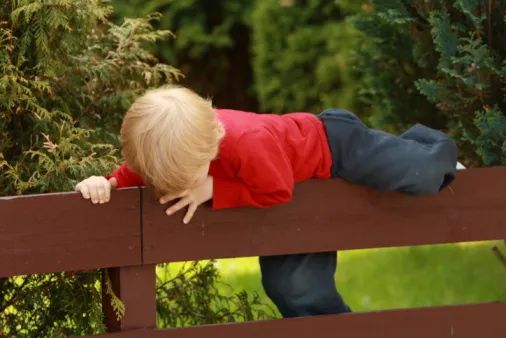What’s Best for My Infant or Toddler: Home, Daycare or School?
The wind nips at my nose and cheeks as we fly down the last hill to the preschool my little boy attends three mornings a week. This hill provides a stunning view of the sunrise over the mountains to the East of town and is a beautiful reminder of why I live where I do. Yet nearly every day as I come down this hill on my bike, my chest begins to tighten and I am overwhelmed with emotion. Behind me, cozy in the attached bike trailer, ride my reasons for living.

We pull into the parking lot and I sing out, “Here we are!” I always try to find something interesting to point out as we come in to help us through the transition; today it is the harvest moon shimmering in the morning sky. We both gaze at it before pulling his lunchbox and little sister from the trailer. I keep up our conversation as we stroll through the gate. As my little boy walks in front of me carrying his lunchbox, I am hit with the self-doubt that lingers just over my shoulder every time I drop him off. Is he too young? Should he be home with mommy instead? Am I doing this for all of the right reasons?
 Letting Go
Letting Go

As a member of the Age of Montessori team, I am well aware of the benefits of Montessori education, like maximizing the potential of the absorbent mind, sensitive periods and prepared environment, to name just a few. However, there are days when I still can’t turn off the voices in my head that tell me I am making a mistake and not to let go of him. Regardless of that, I put on my tough face, tell him “I love you,” give a big hug and wave to him in the window as I ride away. The harder I peddle the easier it is to fight back the tears.
I came across a mother who was asking if at 15 months she needed to start her child in Montessori preschool. My heart ached for this mom who was trying to do the best thing for her child but felt lost and uninformed as to where to begin.
The Best Time to Begin
Montessori explains that the period of the absorbent mind is from conception to age 6. Early childhood Montessori education begins between ages 2½ and 3, depending on the child. Many schools only accept children after their third birthday. This being said, the ideal solution for any Montessori education prior to an early childhood program is having a Montessori environment and practices at home. Parents are the child’s first teacher, after all.
In the first two years, children are making assumptions about the world around them based on the relationships that they have with their caretakers. Meet the baby’s needs with love and patience, and she will come to learn that her world is a place where she is important and understood. Daily activities like grocery shopping, cooking, going for walks and going to the bank help her understand how to interact properly with others in her environment. This is the child’s introduction to practical life routines. (Listen to the replay of our Montessori in the Home webinar)
 When Mom and Dad Cannot Be There
When Mom and Dad Cannot Be There

I don’t think anyone would argue that the ideal main caretaker is a parent, but these are modern times where in many families both parents work and a nanny or daycare is necessary. As a parent, it is wise to educate yourself about the Montessori Method and message, and to design your home environment to function with beauty, order, respect and peace. Any hired nanny should be properly educated on the inner workings of your baby’s environment. Copy relevant articles for your nanny to read that will help him or her provide the best care for your little one. Some important topics to cover are independence, discipline, order, outside time and the child’s daily routine.
If daycare is the route you take for child care, search for one that follows Montessori principles. We are in the middle of a Montessori revival and the awareness is trickling down into child care centers across the country, so it is often easier to find a Montessori-like daycare than one would think. More and more child-care centers are being asked to provide early education for youngsters, not just a safe and loving environment.
Enjoy the Ride
There is a different balance that works for every family, but to answer this mother’s question, I would say that rather than sending your child to a Montessori Infant/Toddler program, create a Montessori environment at home and watch your child thrive in it. Enjoy the close relationship with your child at this age because all too soon your youngster’s hands will pull away. Toddlers squirm out of snuggles and are suddenly capable of performing even the most challenging daily tasks without you. As Maria Montessori said, “The greatest sign of success for a teacher is to be able to say, “The children are now working as if I don’t exist.” This too is the parent’s goal: prepare your child to succeed in life without you.

I would like to encourage all of our readers to share the blogs and wealth of information on Age of Montessori’s website with friends, teachers and relatives. The hope for our world lies in the hearts and minds of our children. The more people we can reach with the Montessori message, the better off our children and the world will be.




















